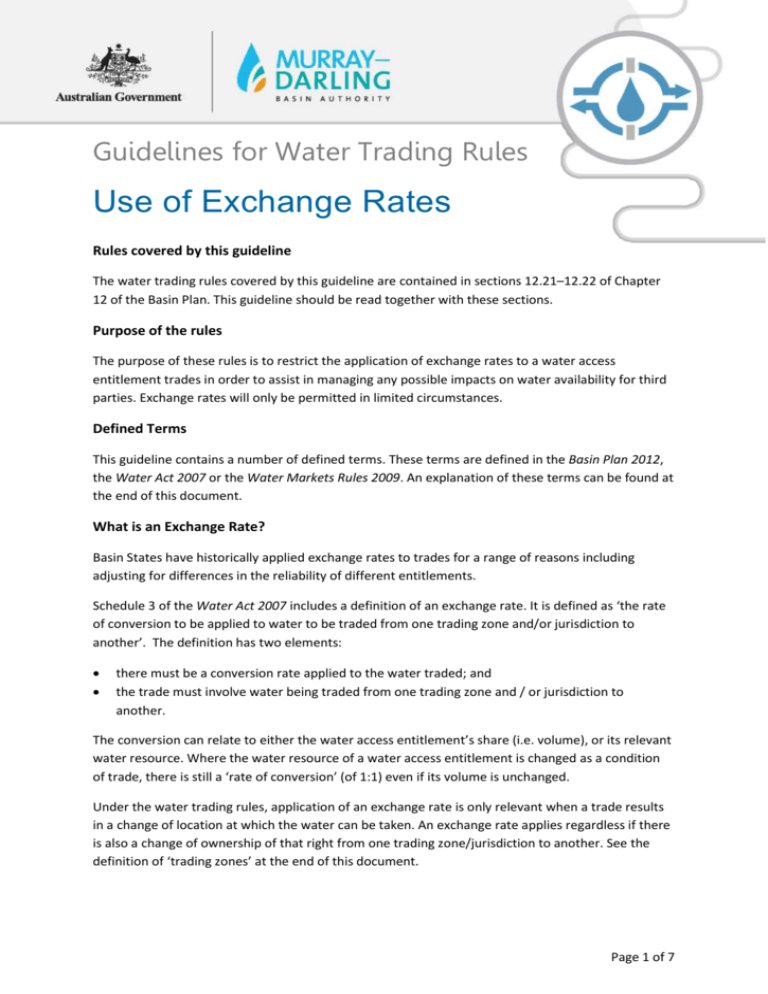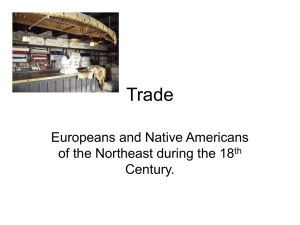Word - Murray-Darling Basin Authority
advertisement

Guidelines for Water Trading Rules Use of Exchange Rates Rules covered by this guideline The water trading rules covered by this guideline are contained in sections 12.21–12.22 of Chapter 12 of the Basin Plan. This guideline should be read together with these sections. Purpose of the rules The purpose of these rules is to restrict the application of exchange rates to a water access entitlement trades in order to assist in managing any possible impacts on water availability for third parties. Exchange rates will only be permitted in limited circumstances. Defined Terms This guideline contains a number of defined terms. These terms are defined in the Basin Plan 2012, the Water Act 2007 or the Water Markets Rules 2009. An explanation of these terms can be found at the end of this document. What is an Exchange Rate? Basin States have historically applied exchange rates to trades for a range of reasons including adjusting for differences in the reliability of different entitlements. Schedule 3 of the Water Act 2007 includes a definition of an exchange rate. It is defined as ‘the rate of conversion to be applied to water to be traded from one trading zone and/or jurisdiction to another’. The definition has two elements: there must be a conversion rate applied to the water traded; and the trade must involve water being traded from one trading zone and / or jurisdiction to another. The conversion can relate to either the water access entitlement’s share (i.e. volume), or its relevant water resource. Where the water resource of a water access entitlement is changed as a condition of trade, there is still a ‘rate of conversion’ (of 1:1) even if its volume is unchanged. Under the water trading rules, application of an exchange rate is only relevant when a trade results in a change of location at which the water can be taken. An exchange rate applies regardless if there is also a change of ownership of that right from one trading zone/jurisdiction to another. See the definition of ‘trading zones’ at the end of this document. Page 1 of 7 Note: A conversion factor that is applied during the conversion of a water access entitlement from one priority or class to another does not meet the definition of an exchange rate. For an exchange rate to apply, water must be traded from one trading zone / jurisdiction to another. Explanation of the rules These rules place limits on the use of exchange rates. The water trading rules require that: a water access entitlement must not be traded in a regulated system or between regulated systems if an exchange rate is applied to the water access entitlement as a condition of the trade (section 12.21), unless; the Murray-Darling Basin Authority makes a declaration permitting the application of an exchange rate (in limited circumstances) (section 12.22). Who do these rules apply to? These rules apply to: Basin States the Murray-Darling Basin Authority (MDBA) Scope of the rules These rules apply to the trade of water access entitlements within or between regulated systems. Section 12.21 does not prohibit the application of exchange rates in all trades. For example, exchange rates can be applied to trades where: the right being traded is not a water access entitlement (e.g. a water allocation) the trade is not within or between regulated systems (e.g. trades between a regulated and unregulated system or between unregulated systems) the trade is using a specific exchange rate and the MDBA has made a declaration under section 12.22 permitting the use of a specific exchange rate to: o o redress the impact of previous exchange rate trade; or address transmission losses. The application and use of exchange rates must be consistent with other Basin Plan water trading rules, including the reasons for allowable restrictions on trade set out in section 12.18. Rule Requirements Exchange rates not to be used in a regulated system Section 12.21 prohibits the trade of water access entitlements within and between regulated systems if an exchange rate is to be applied as a condition of the trade for example where: Page 2 of 7 the trade facilitates the take of water at a different location in a different trading zone that is within or between regulated systems; and a condition of the trade is that there is a change in either one or both of: o o the volume of the water access entitlement; and/or the water resource that the water access entitlement is a share of. Table 1. Examples of when section 12.21 would apply to particular types of trade Example Does the Section 12.21 prohibition apply? Trade of a water access entitlement from location A to location B where the volume of entitlement changes from 100 ML to 90 ML. Yes: the trade involves water being traded from one location (A) to another (B) and a rate of conversion (1: 0.9) is being applied to the water access entitlement being traded. A 100 ML water access entitlement is traded from location A to location B by changing the water resource that the water access entitlement relates to. The volume remains 100ML. Yes: the trade involves a conversion of the water resource of the water access entitlement (with a rate of conversion of 1:1). A 200ML tagged water access entitlement is established allowing water allocation under a water access entitlement in relation to location A to be extracted in location B, but with 10% of the volume ordered withheld from extraction in location B to cover transmission losses. No: while there has been a trade of the water access entitlement (because a tag was established) there has been no conversion of the volume of the water access entitlement itself—the volume of water remains at 200ML when extracted at location A. In location B, the volume relating to the right continues to be 200ML, but only 180ML can be extracted at location B because of the 10% transmission loss factor. Note: These assume that both location A and location B are within a regulated system, but are in different trading zones / Basin States. MDBA declaration of use of exchange rates In order to gain an exemption for using an exchange rate that would otherwise be inconsistent with section 12.21, a Basin State must obtain a declaration from the MDBA (section 12.22). There are two circumstances in which Basin States can seek an exemption from section 12.21: the use of an exchange rate to address transmission losses; or the use of an exchange rate to redress the effects of previous exchange rate trade. If the MDBA is satisfied that the purpose of the exchange rate is for one of the two circumstances outlined above, the MDBA is required to make a declaration specifying the exchange rate to be Page 3 of 7 applied as a condition of the trade and the locations between which the exchange rate trade will occur. NOTE: A declaration authorising the application of an exchange rate in one direction (location A to location B) would not automatically permit exchange rate trade in the opposite direction (from location B to location A). The MDBA is required to make its declaration in writing and publish the declaration on its website. Declaration to address transmission losses In considering an application for a declaration to address transmission losses, the MDBA may take into account a range of matters including: the manner in which the proposed exchange rate(s) have been calculated, including the accuracy of transmission loss accounting measures the variability of actual transmission losses the extent to which transmission losses are otherwise accounted for (for example, under the Murray-Darling Basin Agreement, with non-traded water, or water traded in the opposite direction). Declarations to redress impacts of previous exchange rate trade In considering an application for a declaration to redress impacts of previous exchange rate trade, the MDBA must be satisfied that: the purpose of the exchange rate is to address the impact of previous exchange rate trade; and the total volume of water access entitlements to be traded using the exchange rate would not be more than the total volume of previous exchange rate trade. In considering an application for a declaration, the MDBA may take into account a range of matters including: the manner in which the proposed exchange rate(s) have been calculated the way in which previous exchange rate trades between location A and location B have been accounted for and managed at a wholesale level what, if any, other measures have been undertaken to address the impacts of the previous exchange rate trades between location A and location B. the volume of trade that will be allowed using the exchange rate, and whether such trades may ‘over-correct’ the impacts of historical exchange rate trades the relationship between the proposed exchange rate(s) and any previous exchange rate(s) that were applied to trade in the opposite direction the volume of water access rights previously traded in the opposite direction using exchange rates. Page 4 of 7 Interaction with other Basin Plan water trading rules Interaction between section 12.22 and section 12.20 declaration processes A declaration under section 12.22 should not be confused with a declaration under section 12.20, which relates to declarations in respect to restrictions on trade allowable for physical or environmental reasons. Interaction with other water trading rules Part 2, Division 1, Subdivision A of the water trading rules (sections 12.06–12.15) contain ‘non-discrimination’ rules and rules which support the separation of unbundled rights. Obtaining a declaration under section 12.22 does not remove the need for restrictions to be consistent with sections 12.06 to 12.15. Page 5 of 7 Defined Terms The following definitions are contained in the Basin Plan 2012, the Water Act 2007 or the Water Market Rules 2009. Exchange rate means the rate of conversion to be applied to water to be traded from one trading zone and/or jurisdiction to another. Regulated system means a surface water system in which water in a watercourse can be stored or flow levels can be controlled, through the use of structures such as large dams or large weirs. Trading zones means zones established to simplify administration of a trade by setting out the known supply source or management arrangements and the physical realities of relevant supply systems within the zone so that trade can occur within and between zones without first having to investigate and establish the details and rules of the system in each zone. Unregulated system means a surface water system that is not a regulated system. Water access entitlement means a perpetual or ongoing entitlement, by or under a law of a State, to exclusive access to a share of the water resources of a water resource plan area. Water access right (a) means any right conferred by or under a law of a State to do either or both of the following: i. to hold water from a water resource; ii. to take water from a water resource; and (b) without limiting paragraph (a), includes the following rights of the kind referred to in that paragraph i. stock and domestic rights; ii. riparian rights; iii. a water access entitlement iv. a water allocation; and (c) includes any other right in relation to the taking or use of water that is prescribed by the regulations for the purposes of this paragraph. Water allocation means the specific volume of water allocated to water access entitlements in a given water accounting period. Water resource means: surface water or ground water; or a watercourse, lake, wetland or aquifer (whether or not it currently has water in it); and includes all aspects of the water resource (including water, organisms and other components and ecosystems that contribute to the physical state and environmental value of the water resource). Disclaimer: This Guideline is one of a series of guidelines on the water trading rules and as such it may be appropriate to also consider the information that is set out in other guidelines. The provisions in the Water Act 2007 and the Basin Plan 2012 govern the water trading rules. All decisions regarding the water trading rules need to be made by reference to these laws. This Guideline is intended as Page 6 of 7 guidance only and does not constitute legal advice. Users should seek their own legal advice where appropriate. This Guideline has no statutory force. Whilst decisions in relation to water trading rules may consider this Guideline, decisions will be based on the aforementioned laws. Reasonable care has been taken in the compilation of this Guideline, however the Murray-Darling Basin Authority does not guarantee or warrant the accuracy, or completeness, or currency of its contents and shall not be liable for any loss or damage that may be occasioned directly or indirectly through the use of or reliance on this Guideline. Note that the Guideline will be a living document, to be updated from time to time, in consultation with relevant stakeholders, in order to incorporate new knowledge and best practice. Page 7 of 7






